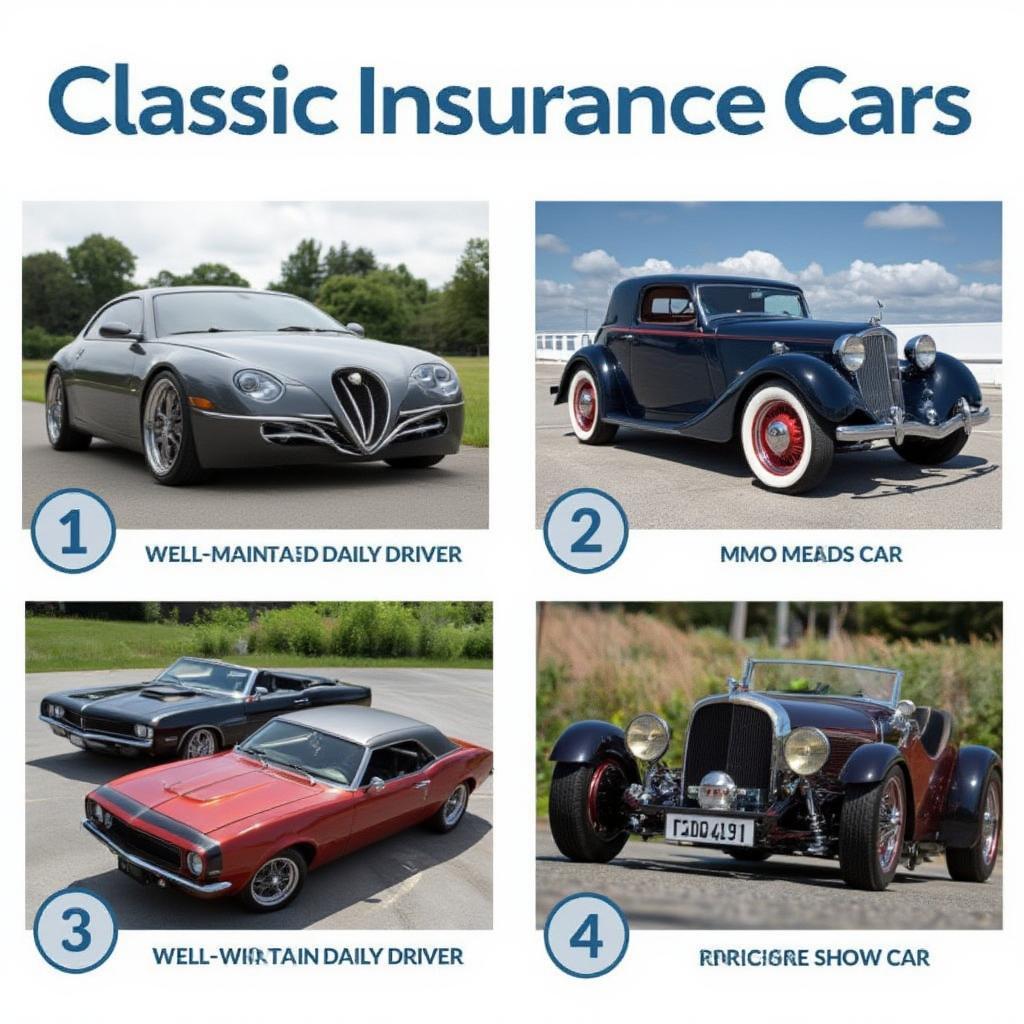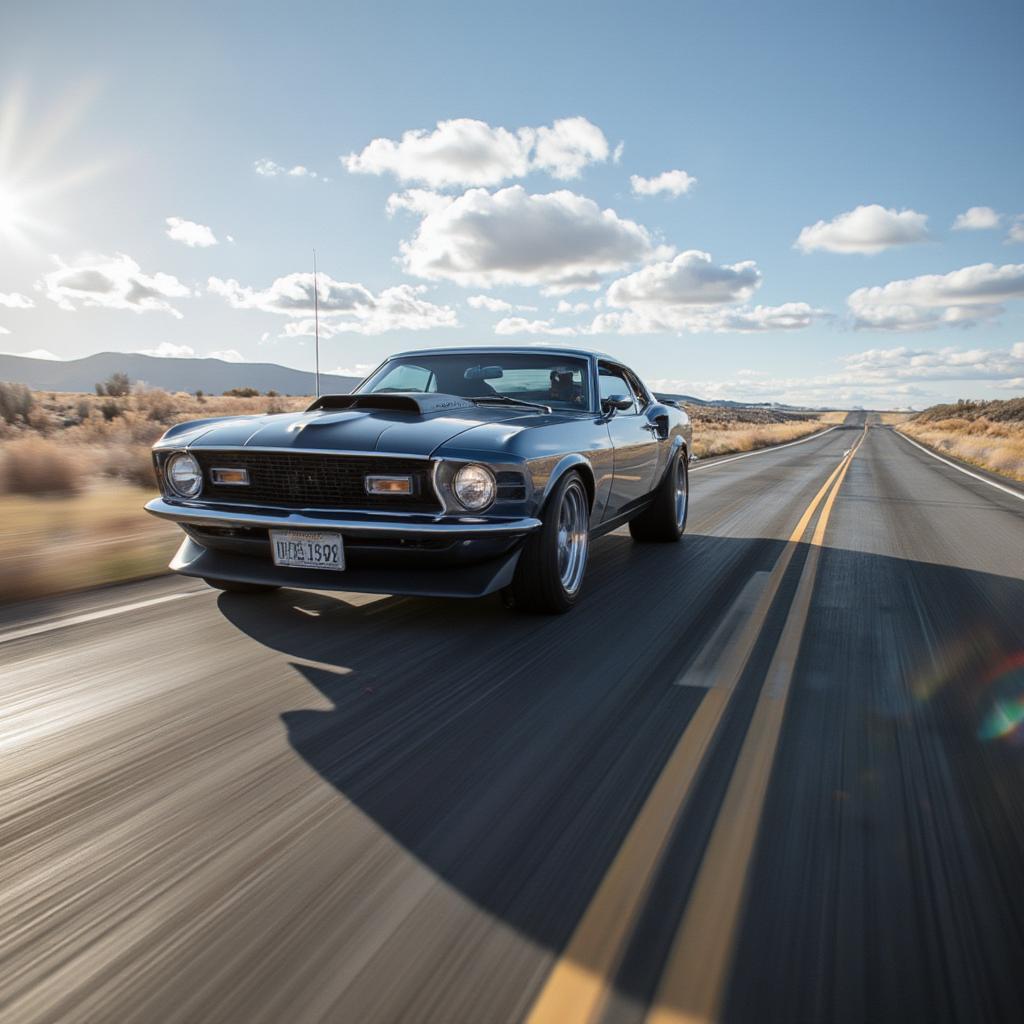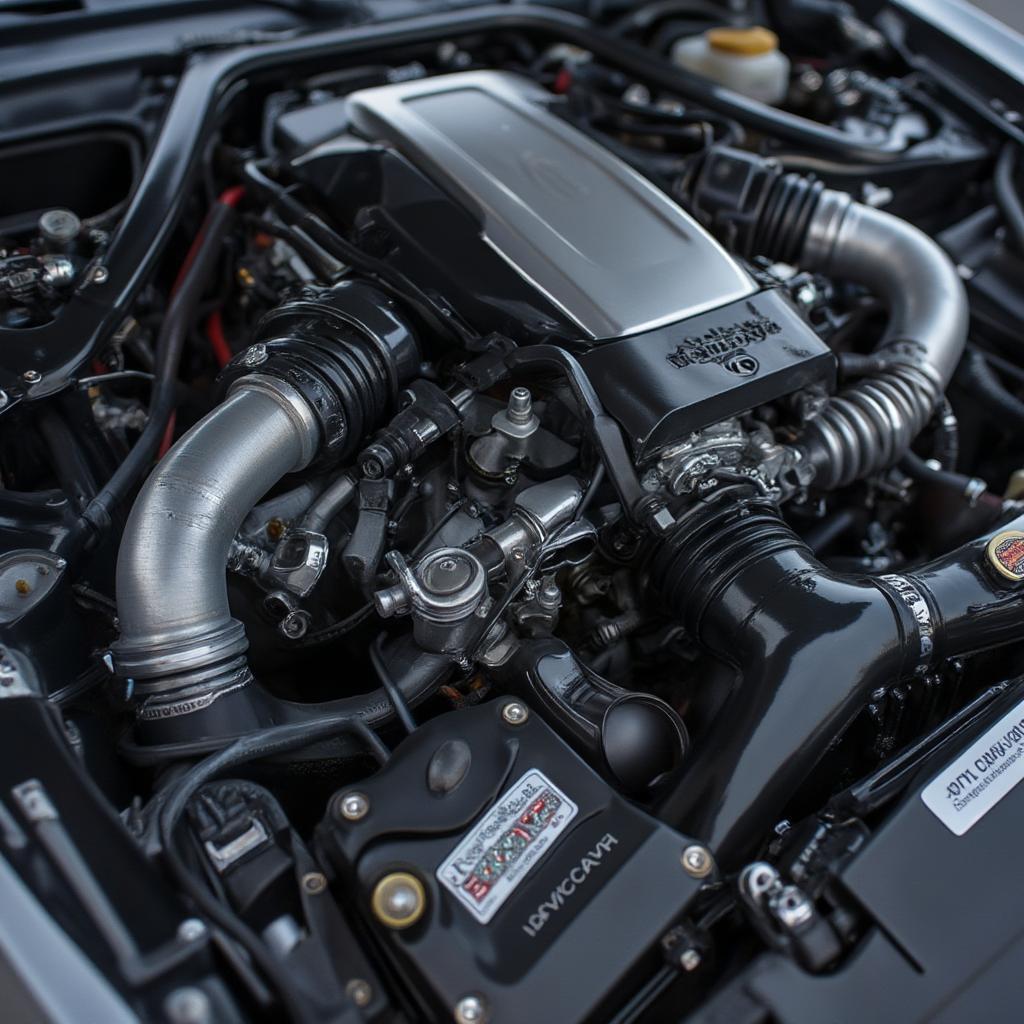Navigating Auto Insurance Coverage for Older Cars: A Complete Guide

Understanding Auto Insurance Coverage For Older Cars can feel like navigating a maze. You’ve got a classic beauty, a vintage treasure, or simply an older model that’s been with you through thick and thin. But does standard insurance cut it? The answer is often more nuanced than a simple yes or no. This guide will help you unravel the complexities of insuring older vehicles, ensuring your beloved ride is properly protected.
Insuring an older vehicle isn’t always as straightforward as insuring a new one. Standard policies are designed for modern cars with readily available parts and established market values. Older cars, however, often have unique characteristics that necessitate a different approach to insurance. We’ll explore the various types of coverage available, the factors that influence your premium, and how to find the best policy to suit your needs.
What Makes Insuring Older Cars Different?
The world of older vehicles is vastly different from that of contemporary models. This difference directly impacts your insurance needs. Let’s break down key distinctions:
- Depreciation vs. Appreciation: While new cars depreciate quickly, older vehicles, particularly classics or antiques, can appreciate in value. Standard insurance often uses depreciation models, which might not adequately cover your older car’s worth.
- Parts Availability: Finding replacement parts for older cars can be difficult, time-consuming, and expensive. This scarcity can influence repair costs and subsequently your insurance premiums.
- Unique Usage: Older cars are often used less frequently than newer ones, perhaps only for weekend drives, car shows, or special occasions. This limited usage can impact the type of coverage required.
- Valuation Challenges: Determining the true value of an older car can be complex. Factors like condition, rarity, and modifications can significantly affect its worth, making traditional market value estimations insufficient.
Understanding the Different Types of Coverage
When it comes to auto insurance coverage for older cars, you have several options, and it’s crucial to understand each one to make the right choice.
- Liability Coverage: This is a basic type of insurance required in most states. It covers damages and injuries you might cause to others in an accident. While essential for all drivers, its sufficiency for older cars depends on the level of damage they can inflict.
- Collision Coverage: This covers damage to your vehicle resulting from a collision with another vehicle or object. If your older car is a daily driver, this coverage might be worthwhile.
- Comprehensive Coverage: This protects your car against non-collision damages like theft, vandalism, fire, or natural disasters. Given the rarity and value of some older models, this coverage is often recommended.
- Agreed Value Coverage: This type of coverage, often favored for classic and antique cars, establishes an agreed-upon value for your vehicle that the insurer will pay out in the event of a total loss, regardless of depreciation.
- Stated Value Coverage: With stated value, you set a value for your vehicle, and if there’s a total loss, the insurance company will pay up to that amount. However, they might pay less if they determine the actual cash value was lower.
“When considering auto insurance coverage for older cars, it’s crucial to understand the difference between ‘actual cash value’ and ‘agreed value’,” notes Robert Thompson, a seasoned insurance broker specializing in classic vehicles. “Agreed value ensures you receive the full agreed-upon amount in a total loss, while actual cash value is subject to depreciation and market conditions.”
Factors Influencing Your Insurance Premiums
Several factors can influence the cost of your auto insurance coverage for older cars. Here’s what insurance companies consider:
- Vehicle’s Age and Condition: The older and more unique your car is, the more expensive it may be to insure, particularly if it is in pristine condition.
- Vehicle’s Usage: How often you use your vehicle will play a crucial role in your premium. A car driven daily will likely have higher premiums than one used only for occasional events.
- Agreed Value or Stated Value: Choosing agreed value coverage, while more expensive than stated value, can offer better protection for valuable vehicles.
- Geographic Location: Like standard insurance, where you live affects your rate. Areas with higher rates of theft or vandalism might incur higher premiums.
- Driving History: Your driving record remains a significant factor. A history of accidents or violations can result in higher premiums.
How to Choose the Right Insurance Policy
Choosing the right auto insurance coverage for older cars requires careful consideration and some research. Here are some steps to follow:
- Assess Your Car’s Value: Before seeking insurance, get your car appraised by a professional experienced in valuing older vehicles, especially if it is a classic or antique car.
- Determine Your Usage: Consider how often you will use your older car. If it’s a daily driver, comprehensive coverage might be beneficial. For weekend drives and shows, you might consider less extensive options.
- Compare Quotes: Gather quotes from several insurance providers who specialize in classic car or collector car insurance, and compare the offerings.
- Read the Fine Print: Carefully review your policy to understand the terms and conditions, and make sure that you understand the exclusions.
- Consider Club Membership: Many classic car clubs offer discounted insurance through partnerships with specific providers, which can provide great benefits and resources.
“Don’t assume that standard insurance policies adequately cover your older car,” advises Eleanor Vance, a classic car restoration expert. “Always opt for a policy that recognizes the unique value and needs of your specific vehicle. It’s also beneficial to document the car’s condition and any modifications.”

Finding a Specialized Insurance Provider
Not all insurance companies understand the nuances of insuring older vehicles. Choosing a specialized insurer is essential. Here’s what to look for:
- Expertise in Classic Cars: Opt for companies with a proven track record of insuring classic, antique, and collector vehicles.
- Flexible Coverage Options: Look for insurers that provide agreed value coverage and understand the specific needs of older cars.
- Knowledgeable Agents: A good insurer will have agents who understand the intricacies of older car valuations and insurance.
- Positive Reviews and Reputation: Check online reviews and testimonials to ensure the provider has a good reputation in the community of older car enthusiasts.
- Claim Handling: Ensure the insurance company has a smooth claim process, a quick turnaround, and reasonable dispute resolution practices.
Key Questions to Ask Your Insurance Provider
Before committing to any insurance plan, ensure you ask the right questions. Here are a few important ones:
- What is the valuation method? Do they use actual cash value or agreed value?
- How are claims processed for specialized parts? Do they understand the intricacies of sourcing vintage components?
- Are there restrictions on usage? Are there any mileage or usage limitations?
- What additional coverage options are available? Can you add specialized coverage for transport or storage?
- How does the deductible work? What would be the financial responsibility for repair or replacement after an accident?
Keeping Your Older Car Insurable
Maintaining your older car in good condition is not just about enjoyment; it also helps with keeping your insurance premiums reasonable. Here are some tips:
- Regular Maintenance: Keep your car well-maintained, which demonstrates responsible ownership and decreases potential risks.
- Secure Storage: Whenever possible, store your older car in a secure location like a garage or covered storage to minimize exposure to damage.
- Documentation: Keep records of all maintenance, repairs, and improvements. This detailed history can help in future valuation or claim processing.
- Participate in Car Clubs: Involvement in clubs can lead to discounted rates and access to valuable knowledge about maintaining your older car.
- Be transparent about modifications: Let your insurance company know of any modification that impacts the car’s value or performance.
“Transparency is key when insuring older cars,” suggests Michael Chen, a vintage car restorer. “Insurance companies need to be fully aware of all modifications, especially if they increase the value or performance of your vehicle. Any surprises can lead to coverage issues.”
Conclusion
Navigating the world of auto insurance coverage for older cars doesn’t have to be overwhelming. By understanding the unique aspects of insuring these vehicles, choosing the right type of coverage, and finding a specialized provider, you can ensure that your treasured older car is protected. Remember that regular maintenance, accurate valuations, and transparent communication with your insurance provider are the key to securing comprehensive protection at the best possible price. With the right insurance in place, you can enjoy the beauty and history of your older car without worry.
Frequently Asked Questions (FAQs)
Q1: What’s the difference between ‘agreed value’ and ‘stated value’ insurance?
A1: Agreed value insurance means that the insurer agrees to pay a set amount if your car is totaled, regardless of depreciation. Stated value sets an upper limit for payout but may be reduced based on actual cash value at time of loss.
Q2: Can I use a standard auto insurance policy for my older car?
A2: While possible, standard policies often do not adequately cover the unique value and repair needs of older vehicles. Specialized policies are often better suited to the nuances of these cars.
Q3: How do I determine the value of my older car for insurance purposes?
A3: The best way is to get a professional appraisal from a qualified appraiser experienced in classic or antique cars. They’ll take into account its condition, rarity, and market trends.
Q4: Does my older car’s limited usage affect my insurance premium?
A4: Yes, typically, if you drive your car less frequently, particularly when driving in limited mileage, it will lower the risk for insurance companies and therefore, premiums might be lower than daily use vehicles.
Q5: Are there any restrictions on the type of older car I can insure?
A5: While most insurers specialize in classics or antiques, there might be limitations on vehicles with certain modifications or extreme conditions. Check with your provider for specific criteria.
Q6: What if I need a rare replacement part?
A6: A specialized insurance policy will generally understand this need and will take that into consideration when processing any damage claims. Working with a specialist agent could lead to better results.
Q7: What are some additional tips to keep my older car insured adequately?
A7: Keep detailed records of any maintenance, get your car professionally appraised, securely store your vehicle, and actively participate in car clubs to be updated on best insurance practice.




